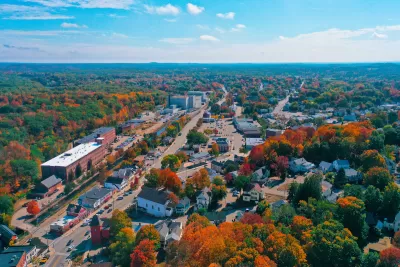Although less visible than in major cities, the housing crisis is no less severe in many rural communities, where being unhoused poses unique challenges.

In an interview with Olivia Weeks for Daily Yonder, Dr. Elizabeth Carpenter-Song describes her research on homelessness in rural New England, highlighting the differences between the experience of urban and rural unhoused people.
As Carpenter-Song explains, “Most research on homelessness in the U.S. had focused on urban settings. I wanted to learn more about what seemed to be very hidden experiences of homelessness in rural areas.”
Rural homelessness is often out of sight, despite a growing housing crisis in many rural communities. “People experiencing homelessness in rural areas move across a variety of settings and may camp in the woods, sleep in cars, or double-up with friends or family for periods of time.”
Housing in rural areas is also more closely tied to transportation, or lack thereof. As people move to access more affordable housing, they often find themselves farther from jobs, schools, and basic needs.
“The main commonality between experiences of homelessness in rural and urban areas is that homelessness is a housing problem,” Carpenter-Song says. “As a society, we are now experiencing the consequences of decades of underinvestment in affordable housing.”
FULL STORY: Q&A: Understanding the Difference Between Rural and Urban Homelessness, With Elizabeth Carpenter-Song

Maui's Vacation Rental Debate Turns Ugly
Verbal attacks, misinformation campaigns and fistfights plague a high-stakes debate to convert thousands of vacation rentals into long-term housing.

Planetizen Federal Action Tracker
A weekly monitor of how Trump’s orders and actions are impacting planners and planning in America.

In Urban Planning, AI Prompting Could be the New Design Thinking
Creativity has long been key to great urban design. What if we see AI as our new creative partner?

Pedestrian Deaths Drop, Remain Twice as High as in 2009
Fatalities declined by 4 percent in 2024, but the U.S. is still nowhere close to ‘Vision Zero.’

King County Supportive Housing Program Offers Hope for Unhoused Residents
The county is taking a ‘Housing First’ approach that prioritizes getting people into housing, then offering wraparound supportive services.

Researchers Use AI to Get Clearer Picture of US Housing
Analysts are using artificial intelligence to supercharge their research by allowing them to comb through data faster. Though these AI tools can be error prone, they save time and housing researchers are optimistic about the future.
Urban Design for Planners 1: Software Tools
This six-course series explores essential urban design concepts using open source software and equips planners with the tools they need to participate fully in the urban design process.
Planning for Universal Design
Learn the tools for implementing Universal Design in planning regulations.
planning NEXT
Appalachian Highlands Housing Partners
Mpact (founded as Rail~Volution)
City of Camden Redevelopment Agency
City of Astoria
City of Portland
City of Laramie





























